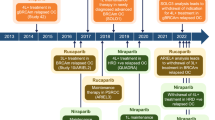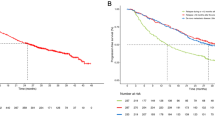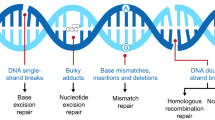Abstract
Background
Phase III trials evaluating the role of secondary cytoreductive surgery (SCS) in recurrent ovarian cancer have pointed to the importance of patient selection. Two studies showed conflicting results regarding the benefit of SCS in BRCA1/2 mutation carriers. Our aim was to evaluate the impact of SCS on recurrent ovarian cancer according to BRCA1/2 status.
Methods
All patients with ovarian carcinoma with platinum-sensitive recurrent disease and tested for BRCA1/2 germline mutations were included. Cox regression and log rank test were used to evaluate the impact of SCS on progression-free survival (PFS) and the influence of BRCA1/2 mutations on the effect of SCS.
Results
127 patients were included, 45.6% were treated with SCS and chemotherapy and 54.3% treated with chemotherapy only. Patients treated with SCS were younger, presented better performance status, had lower CA125, and had a longer platinum-free interval. In multivariate analysis SCS was associated with longer PFS (HR 0.42, 95% CI 0.25–0.72, p = 0.002). BRCA1/2 mutations were found in 35 patients (27.5%), and 11.8% of patients were treated with PARP inhibitors. Although not statistically significant, both BRCA1/2 wild type patients (PFS: 21.6 vs 18.4 months; p = 0.114) and BRCA1/2 mutation carriers (PFS: 23.1 vs 18.2 months, p = 0.193) appeared to derive benefit from SCS.
Discussion
The present study suggests a benefit of SCS irrespective of BRCA1/2 status among patients mostly not treated with PARP inhibitor. Further data on post hoc analysis from the phase III trials are warranted to confirm whether BRCA1/2 mutated patients should be selected for SCS.



Similar content being viewed by others
References
Siegel RL, Miller KD, Jemal A. Cancer statistics, 2020. CA Cancer J Clin. 2020;70(1):7–30. https://doi.org/10.3322/caac.21590
Torre LA, Trabert B, DeSantis CE, et al. Ovarian cancer statistics, 2018. CA Cancer J Clin. 2018. https://doi.org/10.3322/caac.21456
Raja FA, Counsell N, Colombo N, et al. Platinum versus platinum-combination chemotherapy in platinum-sensitive recurrent ovarian cancer: a meta-analysis using individual patient data. Ann Oncol. 2013;24(12):3028–3034. https://doi.org/10.1093/annonc/mdt406
Aghajanian C, Blank S V., Goff BA, et al. OCEANS: A randomized, double-blind, placebo-controlled phase III trial of chemotherapy with or without bevacizumab in patients with platinum-sensitive recurrent epithelial ovarian, primary peritoneal, or fallopian tube cancer. J Clin Oncol. 2012;30(17):2039–2045. https://doi.org/10.1200/jco.2012.42.0505
Coleman RL, Brady MF, Herzog TJ, et al. Bevacizumab and paclitaxel–carboplatin chemotherapy and secondary cytoreduction in recurrent, platinum-sensitive ovarian cancer (NRG Oncology/Gynecologic Oncology Group study GOG-0213): a multicentre, open-label, randomised, phase 3 trial. Lancet Oncol. 2017;18(6):779–791. https://doi.org/10.1016/s1470-2045(17)30279-6
Mirza MR, Monk BJ, Herrstedt J, et al. Niraparib maintenance therapy in platinum-sensitive, recurrent ovarian cancer. N Engl J Med. 2016;375(22):2154–2164. https://doi.org/10.1056/nejmoa1611310
Ledermann J, Harter P, Gourley C, et al. Olaparib maintenance therapy in patients with platinum-sensitive relapsed serous ovarian cancer: a preplanned retrospective analysis of outcomes by BRCA status in a randomised phase 2 trial. Lancet Oncol. 2014. https://doi.org/10.1016/s1470-2045(14)70228-1
Coleman RL, Oza AM, Lorusso D, et al. Rucaparib maintenance treatment for recurrent ovarian carcinoma after response to platinum therapy (ARIEL3): a randomised, double-blind, placebo-controlled, phase 3 trial. Lancet. 2017;390(10106):1949–1961. https://doi.org/10.1016/s0140-6736(17)32440-6
Du Bois A, Vergote I, Ferron G, et al. Randomized controlled phase III study evaluating the impact of secondary cytoreductive surgery in recurrent ovarian cancer: AGO DESKTOP III/ENGOT ov20. J Clin Oncol. 2017;35(15_suppl):5501. https://doi.org/10.1200/jco.2017.35.15_suppl.5501
Coleman RL, Spirtos NM, Enserro D, et al. Secondary surgical cytoreduction for recurrent ovarian cancer. N Engl J Med. 2019;381(20):1929–1939. https://doi.org/10.1056/nejmoa1902626
Bois A, Sehouli J, Ferron G, et al. Randomized phase III study to evaluate the impact of secondary cytoreductive surgery in recurrent ovarian cancer: Final analysis of AGO DESKTOP III/ENGOT-ov20. J Clin Oncol. 2020;38:6000. https://doi.org/10.1200/jco.2020.38.15_suppl.6000
Zang R, Zhu J, Shi T, et al. A randomized phase III trial of secondary cytoreductive surgery in later recurrent ovarian cancer: SOC1/SGOG-OV2. J Clin Oncol. 2020;38(15_suppl):6001. https://doi.org/10.1200/jco.2020.38.15_suppl.6001
13. Bell D, Berchuck A, Birrer M, et al. Integrated genomic analyses of ovarian carcinoma. Nature. 2011;474(7353):609-615. https://doi.org/10.1038/nature10166
Cotrim DP, Ribeiro ARG, Paixão D, et al. Prevalence of BRCA1 and BRCA2 pathogenic and likely pathogenic variants in non-selected ovarian carcinoma patients in Brazil. BMC Cancer. 2019;19(1):1–9. https://doi.org/10.1186/s12885-018-5235-3
Norquist BM, Harrell MI, Brady MF, et al. Inherited mutations in women with ovarian carcinoma. JAMA Oncol. 2016;2(4):482–490. https://doi.org/10.1001/jamaoncol.2015.5495
Harter P, Hauke J, Heitz F, et al. Prevalence of deleterious germline variants in risk genes including BRCA1/2 in consecutive ovarian cancer patients (AGO-TR-1). PLoS One. 2017;12(10):1–12. https://doi.org/10.1371/journal.pone.0186043
Maistro S, Teixeira N, Encinas G, et al. Germline mutations in BRCA1 and BRCA2 in epithelial ovarian cancer patients in Brazil. BMC Cancer. 2016;16(1):1–8. https://doi.org/10.1186/s12885-016-2966-x
Bolton KL, Chenevix-Trench G, Goh C, et al. Association between BRCA1 and BRCA2 mutations and survival in women with invasive epithelial ovarian cancer. JAMA. 2012;307(4):382–390. https://doi.org/10.1001/jama.2012.20
Alsop K, Fereday S, Meldrum C, et al. BRCA mutation frequency and patterns of treatment response in BRCA mutation-positive women with ovarian cancer: a report from the Australian ovarian cancer study group. J Clin Oncol. 2012;30(21):2654–2663. https://doi.org/10.1200/jco.2011.39.8545
Lavie O, Chetrit A, Novikov I, Sadetzki S. Fifteen-year survival of invasive epithelial ovarian cancer in women with BRCA1/2 mutations—the National Israeli Study of Ovarian Cancer. Gynecol Oncol. 2019;153(2):320–325. https://doi.org/10.1016/j.ygyno.2019.02.022
Marchetti C, De Leo R, Musella A, et al. BRCA Mutation status to personalize management of recurrent ovarian cancer: a multicenter study. Ann Surg Oncol. 2018;25(12):3701–3708. https://doi.org/10.1245/s10434-018-6700-6
Marchetti C, Rosati A, Scaletta G, et al. Secondary cytoreductive surgery in platinum-sensitive recurrent ovarian cancer before olaparib maintenance: Still getting any benefit? A case-control study. Gynecol Oncol. 2019;155(3):400–405. https://doi.org/10.1016/j.ygyno.2019.09.020
Moore K, Colombo N, Scambia G, et al. Maintenance olaparib in patients with newly diagnosed advanced ovarian cancer. N Engl J Med. 2018;379(26):2495-2505. https://doi.org/10.1056/nejmoa1810858
Ray-Coquard I, Pautier P, Pignata S, et al. Olaparib plus bevacizumab as first-line maintenance in ovarian cancer. N Engl J Med. 2019;381(25):2416–2428. https://doi.org/10.1056/nejmoa1911361
González-Martín A, Pothuri B, Vergote I, et al. Niraparib in patients with newly diagnosed advanced ovarian cancer. N Engl J Med. 2019;381(25):2391–2402. https://doi.org/10.1056/nejmoa1910962
Hyman DM, Long KC, Tanner EJ, et al. Outcomes of primary surgical cytoreduction in patients with BRCA-associated high-grade serous ovarian carcinoma. Gynecol Oncol. 2012;126(2):224–228. https://doi.org/10.1016/j.ygyno.2012.05.001
Petrillo M, Marchetti C, De Leo R, et al. BRCA mutational status, initial disease presentation, and clinical outcome in high-grade serous advanced ovarian cancer: a multicenter study. Am J Obstet Gynecol. 2017;217(3):334.e1–334.e9. https://doi.org/10.1016/j.ajog.2017.05.036
Liu Z, Beach JA, Agadjanian H, et al. Suboptimal cytoreduction in ovarian carcinoma is associated with molecular pathways characteristic of increased stromal activation. Obstet Gynecol Surv. 2016;71(5):285–286. https://doi.org/10.1097/ogx.0000000000000320
Author information
Authors and Affiliations
Corresponding author
Ethics declarations
Disclosure
The authors declare that they have no conflict of interest.
Additional information
Publisher's Note
Springer Nature remains neutral with regard to jurisdictional claims in published maps and institutional affiliations.
Electronic supplementary material
Below is the link to the electronic supplementary material.
Rights and permissions
About this article
Cite this article
Estati, F.L., Pirolli, R., de Alencar, V.T.L. et al. Impact of BRCA1/2 Mutations on the Efficacy of Secondary Cytoreductive Surgery. Ann Surg Oncol 28, 3637–3645 (2021). https://doi.org/10.1245/s10434-020-09366-w
Received:
Accepted:
Published:
Issue Date:
DOI: https://doi.org/10.1245/s10434-020-09366-w




